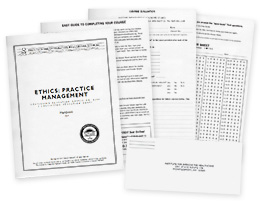Many people could benefit from developing the crucial business skill of time management, a proficiency that can transform any professional’s life from one of overwhelm to one of ease. Massage therapists are among those who could profit from evaluating their daily activities and carefully budgeting their time. Between advertising, seeing clients, grounding between appointments, accounting, billing, continuing education, staying up-to-date on health issues and having a fulfilling personal life – it may seem impossible to find the time for it all.
Even with the abundant number of responsibilities that a healthcare practitioner may have, harmony between his or her practice and home life can be achieved. By increasing awareness of what you are currently doing, what you would like to be doing and taking steps to bridge the gap between the two, massage therapists can achieve their daily goals.
Six practical ways for a bodyworker to make better use of his or her time are described below:
1. Prioritize – Time management experts insist that 24 hours per day affords enough time to tend to your priorities. Prioritizing is the key to having enough time to accomplish what you must. Determine your priorities and say no to everything that doesn’t fit within them. After writing down what must be done, take the time to decide which tasks to tackle first. By creating a prioritization order, your time can be focused on the most important projects first. Do not forget to prioritize your life outside of work.
2. Balance – In terms of professional longevity, taking care of your family, friendships and your health is just as important as your career. As described by Stephen Covey in his bestseller, The Seven Habits of Highly Effective People, balancing all of these areas are essential to an individual’s effectiveness. Investing time in relationships, exercise and your own sanity will increase your productivity in all areas. This is especially poignant when considering how many massage therapists get burned out by their profession. Only by purposefully balancing work, love, home and play can bodyworkers have enough energy to devote to their practice.
After deciding on a balanced, prioritized to-do-list, eliminate the greatest barrier to effective time management – time wasters. Usually composed of trivial events, time wasters can be challenging to spot at first try. Suggestions for identifying and eliminating notorious time wasters, include:
3. Plan – Develop a good filing system and be orderly in your habits to help manage time more effectively.
Example = Rely on a user-friendly Rolodex or PDA to eliminate the extra 10 minutes you might spend trying to locate a client’s phone number.
4. Delegate – Reduce your responsibilities by delegating tasks closer to the bottom of your priority list.
Example = So that you can check vacuuming and dusting off your to-do-list, hire someone or trade with a client who owns an office/home cleaning business.
5. Focus – Make it as easy as possible to focus on the task at hand. In addition to preventing disruptions during a session, reduce interruptions or distractions when completing other jobs, too.
Example = Don’t answer the phone or check your email during time reserved for accounting.
6.Put a Price On It – Another way to eliminate time wasters is to cognitively assign a monetary value to your time. When you’re not sure if an activity is worthwhile, calculate how much it’ll cost you to do it. Within this perspective, it is easier to recognize when a non-prioritized activity is costing you more than it’s worth.
Massage therapists are often found shouldering more than one person’s share of everyday tasks. As individuals often fulfilling the caretaker’s persona, getting bogged down by an endless number of responsibilities is all too common for bodyworkers. This pattern cries out for better time management skills. By working with the practical steps listed above, therapists can narrow down their daily agenda to include only their priorities, eliminate things that waste their time – and most importantly – find balance between their professional and personal lives.













